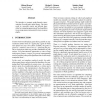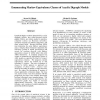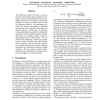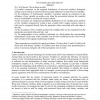116
click to vote
UAI
2001
15 years 2 months ago
2001
We introduce a compact graph-theoretic representation for multi-party game theory. Our main result is a provably correct and efficient algorithm for computing approximate Nash equ...
116
Voted
UAI
2001
15 years 2 months ago
2001
We present a propositional logic to reason about the uncertainty of events, where the uncertainty is modeled by a set of probability measures assigning an interval of probability ...
89
Voted
UAI
2001
15 years 2 months ago
2001
In this work we focus on efficient heuristics for solving a class of stochastic planning problems that arise in a variety of business, investment, and industrial applications. The...
97
Voted
UAI
2001
15 years 2 months ago
2001
83
Voted
UAI
2001
15 years 2 months ago
2001
The Information bottleneck method is an unsupervised non-parametric data organization technique. Given a joint distribution
UAI
2001
15 years 2 months ago
2001
A serious problem in learning probabilistic models is the presence of hidden variables. These variables are not observed, yet interact with several of the observed variables. Dete...
89
Voted
UAI
2001
15 years 2 months ago
2001
In previous work [8] we presented a casebased approach to eliciting and reasoning with preferences. A key issue in this approach is the definition of similarity between user prefe...
UAI
2001
15 years 2 months ago
2001
In this paper, we present an efficient algorithm for performing stepwise selection in the class of decomposable models. We focus on the forward selection procedure, but we also di...
91
Voted
UAI
2001
15 years 2 months ago
2001
It is "well known" that in linear models: (1) testable constraints on the marginal distribution of observed variables distinguish certain cases in which an unobserved ca...
101
Voted
UAI
2001
15 years 2 months ago
2001
Common wisdom has it that small distinctions in the probabilities quantifying a belief network do not matter much for the results of probabilistic queries. Yet, one can develop re...




